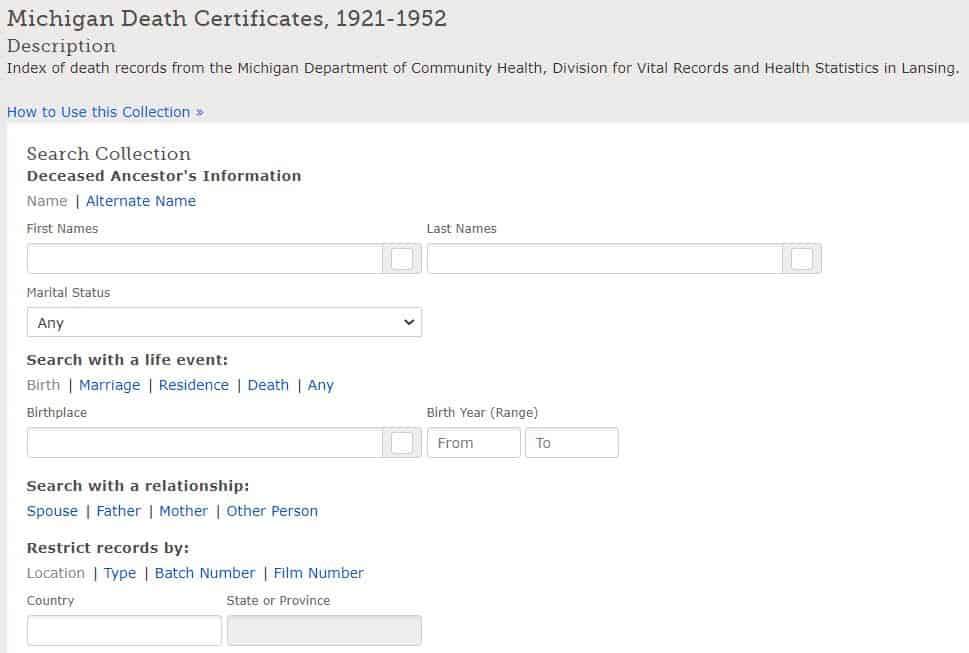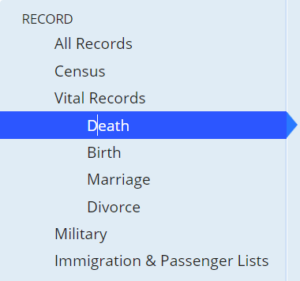
Search for Death Records in Michigan
Free Michigan Death Records Lookup

We receive referral fees from partners (advertising disclosure)
The information we provide you is free of charge and a result of extensive research by our product experts. We use affiliate links in our site that provide us with referral commissions. While this fact may not influence the information we provide, it may affect the positioning of this information.


Our comprehensive guide to the death records in the state of Michigan will help you in finding death records as well as provide you with relevant information about the deceased and the life they lived.

Death Records in Michigan -
The Ultimate Guide 2026
- UPDATED February 2026
Michigan Death Records
The Division for Vital Records & Health Statistics files, registers, issues and preserves certified vital records in the state of Michigan, including death records and fetal death records. These records keep account of events that occurred in the state and they date back to 1867.

Michigan Death Databases
Michigan acquires statehood in January 1837 becoming the 26th state. Death records in each county (copies also being sent to the state) started in January 1867, although vital records registration was not fully enforced by then. In 1905, a more stringent and effective law on death record registration was put in place with full compliance happening by 1915.
Michiganology.org holds death records and other vital statistics from the microfilm collections that are found at the Library of Michigan as well as the Department of Health & Human Services’ Vital Records Office. Digital images of these death certificates/ records are available for death records that are at least 75 years old. Any records that are not yet 75 years old can still be viewed, although their images are not available yet. In accordance to state law in Michigan, vital records need to be at least 75 years old if they are to be made publicly available.

Death Certificates in Michigan
In the state of Michigan, death records start off as private records then they become publicly available 75 years after the record file date. There are restrictions to obtaining death certificates for individuals who passed on within the last 75 years. Below is a list of people who are eligible to request for a death certificate:
- A registrant with whom the record is associated with
- Spouse
- Parents
- A descendant such as child / grandchild
- An individual with common ancestry (relative such as cousin, aunt, uncle, sibling or grandparent)
- Registrant’s legal guardian
- Agency / individual acting on the registrant’s behalf
- Legal representative to registrant’s estate
How to Find Michigan Death Records
Obtaining Michigan death records from Archives.com is the most dependable method of doing so. Following your registration for an account, you will have complete access to the death records for the state of Michigan as soon as you log in to the platform. The following are a few simple steps to get you started:
Step 1: Go to Archives.com and sign in using your email address and password.

Step 2: Use the buttons at the very top of the user page to navigate through the options. When you click on the “Search” button, the Michigan state death records page is loaded.

Step 3: Check the box next to “Vital Records,” then click on the “Death” button just below it. Thus, the site eliminates all other records and only displays death records, which you can then download.

Step 4: Key in as much information about the deceased as you can remember about them.

Step 5: The state of Michigan should be entered in the ‘Location’ box. As soon as you begin typing, you will notice that the website will provide a match for you.
Step 6: You will be presented with a list of records; you will need to scroll through the list until you find the person whose records you are interested in viewing.
Step 7: Click on the name of the deceased to view the death record that is currently available online. In most cases, you will be able to obtain their full name as well as their maiden name if they were previously married. You can also find out about their burial arrangements, such as whether they were cremated or buried, and whether a biographical sketch is available.
Alternative Sources for Michigan Death Information
- Resourceful websites
- Obituaries
- Courthouses
- City Directories
- Tax Records
Michigan Death Records FAQs
What is an Official Death Certificate?
An official death certificate refers to a death certificate that is issued directly by the Michigan state government or any similar organization. This documents contains information such as the individual’s name, physical address, date of birth, and date of death.
What are death records?
Death records are official files that give any useful information about a deceased individual. If you’re doing genealogical research, these records come in handy as they contain most of the information you’d need to learn more about your ancestry. Most death records are held by the state the deceased lived or died in, but they lack the burial state of the deceased. Both cemeteries and churches hold death records, as with state governments. Information you can obtain from death records includes the full name, date of birth, date of death, and place of death.
Are Michigan Death Records Open to the Public?
According to the Michigan Revised Statutes, vital records such as birth records, divorce records, marriage records, adoption records, death records, and other life records are available to all eligible parties with a direct relationship to the person named on the record.
What Information Do I Need to Search for Michigan Death Records Online?
Requesters who wish to get a hold of a death record must be well acquainted with basic facts associated with it including:
- Deceased’s name
- Valid reason for death record request
- Death date
- County or city of death
- Valid proof of identification
Conclusion
The state of Michigan is extremely particular about the accuracy of its tax and voting records, and this is reflected in its state records. As a result, they strive to keep a comprehensive death record up to date. Following the death of a person, tax collectors contact family members or next of kin to collect any unpaid state taxes that may be owed to the state. In the event of a probate proceeding, these death records will be extremely useful because your family members or next of kin will not have any difficulties in obtaining any legal information. With our comprehensive guide to Michigan death record searches, you’ll be able to locate any type of record that you might require in a matter of minutes.
Disclaimer: OurPublicRecords mission is to give people easy and affordable access to public record information, but OurPublicRecords does not provide private investigator services or consumer reports, and is not a consumer reporting agency per the Fair Credit Reporting Act. You may not use our site or service or the information provided to make decisions about employment, admission, consumer credit, insurance, tenant screening, or any other purpose that would require FCRA compliance.

Copyright © 2026 · OurPublicRecords.org · All Rights Reserved